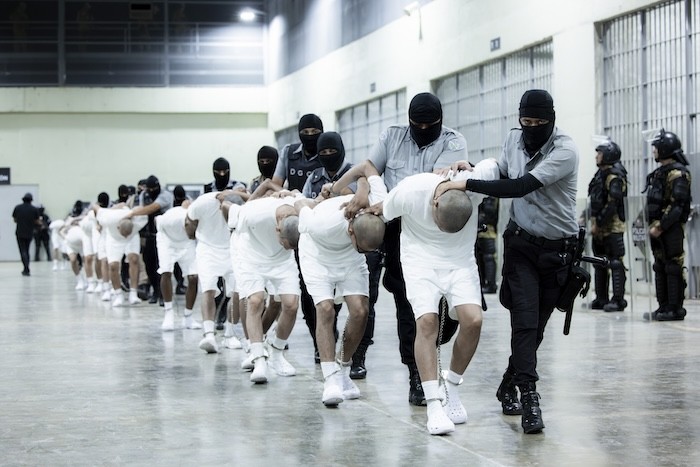(Headline USA) On Monday, the Trump administration announced the deportation of 17 additional individuals described as “violent criminals” affiliated with the Tren de Aragua and MS-13 gangs, sending them to El Salvador. This move reinforces a controversial policy of removing people from the United States to third-party countries, despite ongoing criticism regarding transparency and human rights concerns.
According to the State Department, the deportations took place Sunday evening and included individuals accused of murder and rape, although specific details regarding their nationalities or alleged offenses were not provided. However, the office of El Salvador’s President Nayib Bukele confirmed that the group included Salvadoran and Venezuelan nationals.
“These criminals will no longer terrorize our communities and citizens,” Secretary of State Marco Rubio declared in the statement. “Once again, we extend our gratitude to President Bukele and the government of El Salvador for their unparalleled partnership.”
According to the State Department, the men were flown to El Salvador by the U.S. military. Video footage released by the Salvadoran government shows the deportees arriving by bus at a maximum-security prison, where they were changed into standard white T-shirts and shorts and had their heads shaved.
Earlier in March, more than 200 Venezuelan migrants facing deportation were also sent to El Salvador and are being detained in the same maximum-security facility.
The Trump administration has similarly deported individuals from various countries to other Central American nations; however, El Salvador remains the only country to which the U.S. sends deportees explicitly for incarceration.
On Monday evening, Trump praised Bukele and said to reporters, “I got elected on the basis of getting bad people out of our country that shouldn’t be here.”
President Trump has alleged that the Venezuelan gang Tren de Aragua is “invading” the United States, invoking the Alien Enemies Act of 1798—a wartime measure granting the president extensive authority to expedite mass deportations.
Under this authority, dozens of individuals were previously deported to El Salvador, though further removals were halted by a federal judge. The Trump administration is now petitioning the Supreme Court to permit it to resume these deportations.
The State Department, Department of Homeland Security, and Department of Defense, all of which coordinated Sunday’s deportations, have declined to disclose specific information about the deportees, including their identities, alleged offenses, or the precise legal basis for their removal.
On Friday, a federal judge temporarily halted the administration’s policy of deporting individuals to third countries without first allowing them a meaningful opportunity to argue that such deportations could threaten their safety.
Specifically, the judge ruled that individuals subject to final deportation orders must be granted a substantive chance to demonstrate that being sent to a country other than their homeland would pose substantial risks.
In response, the Trump administration on Sunday asked the court to reverse the ruling and provided updated guidelines outlining how Homeland Security evaluates the deportation of individuals to third-party countries.
Meanwhile, on Monday, lawyers retained by the Venezuelan government to represent citizens deported from the U.S. and currently imprisoned in El Salvador filed a formal request with El Salvador’s Human Rights Ombudsman.
The lawyers asked the ombudsman to confirm that their clients are detained at the maximum-security prison, assess their medical conditions, and ensure appropriate healthcare.
Neither U.S. nor Salvadoran authorities have publicly provided the names of individuals deported and detained in El Salvador earlier this in March.
Jaime Ortega, a lawyer representing the detainees, emphasized that the U.S. government has yet to provide evidence demonstrating the criminality of the deportees.
Last week, Ortega’s law firm filed habeas corpus petitions on behalf of 30 Venezuelans among the more than 200 previously deported; they indicated they have no additional information about the individuals deported on Sunday.
Additionally, on Monday, a federal judge halted the Trump administration’s efforts to terminate temporary legal protections for hundreds of thousands of Venezuelans, just one week before these protections were due to expire.
Adapted from reporting by the Associated Press

